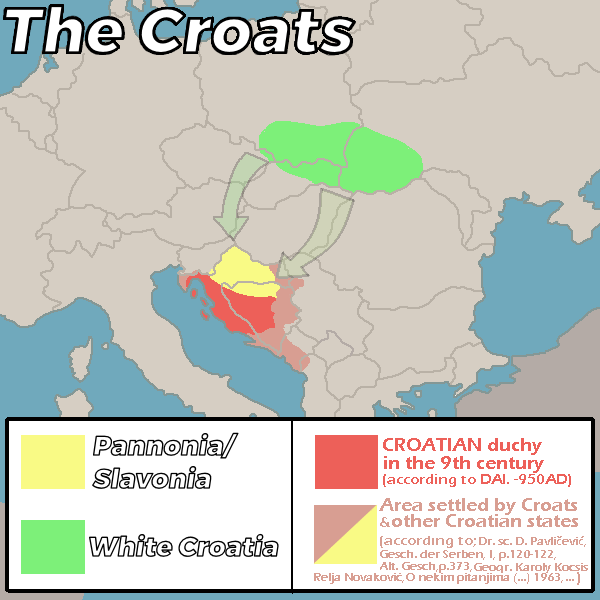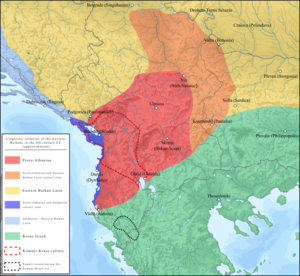0















| Thumbs Up |
| Received: 14 Given: 7 |

They claim they are the original inhabitants of these territories yet history teaces us they invaded these areas. And they claim Albanians invaded their land , this is what they claim.
The first major Slav raids took place in the middle of Justinian's reign. In 547 and 548 they invaded the territory of modern Kosovo, and then (probably via Macedonia and the Via Egnatia across central Albania) got as far as Durres on the northern Albanian coast. [4] More substantial invasions took place in the 580s, bringing Slavs deep into Greece. Historians used to think that it was only these later invasions that involved any permanent settlement; but there is evidence of Slav place-names in the Balkans - particularly along the river Morava - by the 550s, which suggests a more continuous process of infiltration. [5] One factor which may have turned the southward movement of Slavs from a trickle to a flood was the arrival, in the north-western part of the Balkans, of an especially warlike Turkic tribe, the Avars, who subjugated or coopted some Slavic tribes but drove many others away. By the early seventh century the Avar armies were raiding as far as the walls of Constantinople, and threatening the very existence of the Byzantine Empire.
By the mid-seventh century, Serbs (or Serb-led Slavs) were penetrating from the coastal lands of Montenegro into northern Albania. Major ports and towns such as Durres and Shkodra held out against them, but much of the countryside was Slavicized, and some Slav settlers moved up the valleys into the Malesi. By the ninth century, Slav-speaking people were an important element of the population in much of northern Albania, excluding the towns and the higher mountainous areas (especially the mountains in the eastern part of the Malesi, towards Kosovo). [8] Slav-speaking people lived in the lowlands of this area, gradually becoming a major component of the urban population too, until the end of the Middle Ages
So you basically invade someones country and then claim you are the original inhabitant based on that and the people that probably lived in these areas for thousands of years before your ass arrived now came to your ''land'' , amazing how that works
Finally, before turning to the most mysterious problem of all - the origin of the Albanians - it is worth looking once more at the pattern of settlement in the Kosovo area during the early Slav centuries. Kosovo did not fall within the Serb territory of Rascia, which was further to the north-west: the Serbian expansion into Kosovo began in earnest only in the late twelfth century. About the other early Slav settlers in this part of the Balkans we have much less information. Byzantine sources just referred generally to 'Sklaviniai', Slav territories, in the Macedonian region; in the few cases when they made more localized references they often used names derived from rivers, so that it is not clear whether these were the names of Slav tribes or just geographical labels. The 'Moravoi' or 'Moravlians', for example, who are first mentioned in the ninth century, lived somewhere near the river Morava, but that is all we know about them. Historical map-makers, who do not like leaving too many blank spaces, place these Moravlians over much of south-eastern Serbia from as early as the sixth century, with arrows showing them passing into Kosovo; real evidence for this is lackingOnly in the ninth century do we see the expansion of a strong Slav (or quasi-Slav) power into this region. Under a series of ambitious rulers, the Bulgarians - a Slav population which absorbed, linguistically and culturally, its ruling elite of Turkic Bulgars - pushed westwards across modern Macedonia and eastern Serbia, until by the 850s they had taken over Kosovo and were pressing on the borders of Rascia. Soon afterwards they took the western Macedonian town of Ohrid; having recently converted to Christianity, the Bulgar rulers helped to set up a bishopric in Ohrid, which thus became an important centre of Slav culture for the whole region. And at the same time the Bulgarians were pushing on into southern and central Albania, which became thoroughly settled by Bulgarian Slavs during the course of the following century. [19]
Kosovo was to remain under Bulgarian or Macedonian rulers until 1014-18, when the army of the Macedonian-based Tsar Samuel died, his empire broke up, and Byzantine power was fully re-established by a strong and decisive Emperor, Basil 'the Bulgar-killer'. For nearly two centuries after that, Kosovo would stay under Byzantine rule. [20]
Origins: Serbs, Albanians and Vlachs
Yes, you the originals













| Thumbs Up |
| Received: 14 Given: 7 |

The original population from Poland and the Czech Republic














| Thumbs Up |
| Received: 14 Given: 7 |

Not sure how accurate this one is














| Thumbs Up |
| Received: 14 Given: 7 |

Where Albanian originated according to various linguists:














| Thumbs Up |
| Received: 14 Given: 7 |

Where is all the Serb history in the territory of Dardania/Kosova ?
The previous chapter brought the political history (if such it may be called) of Kosovo up to the final period of Bulgarian-Macedonian rule, before the territory of Tsar Samuel was reconquered by the Byzantine Emperor Basil the Bulgar-slayer. Medieval Kosovo is often referred to in general terms as 'the cradle of the Serbs', as if it had been a Serb heartland from the outset; but the reality was rather different. Just over 800 years separate the arrival of the Serbs in the Balkans in the seventh century from the final Ottoman conquest in the 1450s: out of those eight centuries, kosovo was Serb-ruled for only the last two-and-a-half - less that one third of the entire period. Bulgarian khans or tsars held Kosovo from the 850s until the early eleventh century, and Byzantine Emperors until the final decades of the twelfth.
Unfortunately there is very little direct evidence about conditions in Kosovo during those earlier centuries of Bulgarian and Byzantine rule. We can assume that the Slav population that had settled in Kosovo was brought within the cultural realm of the Bulgarian empire, which means that it would have been included in the Bulgarian dioceses of the Orthodox church. Thanks to the work of Saints Cyril and Methodius (and their followers) in the ninth century, the Slavs had a liturgy and other texts in their own language, written in either of two newly invented alphabets: Cyrillic and Glagolitic. The western macedonian town of Ohrid developed strongly as a cultural and religious centre in the ninth and tenth centuries, and by the end of Tsar Samuel's reign the archbishopric of Ohrid included bishoprics in Skopje, Lipljan (Alb.: Lipjan; a town just south of Pristina) and Prizren. [1] Although the formal division of the Christian Church into Roman Catholic and Eastern Orthodox did not occur until 1054, it would not be anachronistic to describe this Bulgarian Christianity as Eastern in the ninth and tenth centuries; the roots of the conflict between East and West went back a long way. (The Slav liturgy was at first violently rejected by the Roman Church, on the grounds that God spoke only three languages: Hebrew, Greek and Latin).
Wow , I am so impressedThe originals














| Thumbs Up |
| Received: 14 Given: 7 |

Obviously some Slavs did spread through all these areas sooner or later. But there is one intriguing line of argument to suggest that the Slav presence in Kosovo and the southernmost part of the Morava valley may have been quite weak in the first one or two centuries of Slav settlement. If Slavs had been evenly spread across this part of the Balkans, it would be hard to explain why such a clear linguistic division emerged between the Serbo-Croat language and the Bulgarian-Macedonian one. The scholar who first developed this argument also noted that, in the area dividing the early Serbs from the Bulgarians, many Latin place-names survived long enough to be adapted eventually into Slav ones, from Naissus (Nish), down through the Kosovo town of Lypenion (Lipljan) to Scupi (Skopje): this contrasts strongly with most of northern Serbia, Bosnia and the Dalmatian hinterland, where the old town names were completely swept aside. His conclusion was that the Latin-speaking population, far from withering away immediately, may actually have been strengthened here (and in a western strip of modern Bulgaria), its numbers swelled, no doubt, by refugees from further north. These Latin-speakers would have thus formed 'a wide border-zone between the Bulgarians and the Serbs'. [18]















| Thumbs Up |
| Received: 289 Given: 372 |

White Croatia as a concept you shown here is a made up thing which mixes several narratives from different sources and relies on legends, which contradict more precise sources.
No written source from more or less the era (8th-early 12th century) tells us of an existence of such a polity/confederation in the territory of Poland. Instead the most important one, the Bavarian Geographer (describing the lands behind the Danube river in Central and Eastern Europe) do not mention Croats at all (which means there was no major tribe called Croats in the area of Poland and Połabie as this is where we have a more or less clear picture).
Same with White Serbia - both are concepts which are meant to give an original "homeland" to Croats and Serbs respectively, but which confuse the actual knowledge coming from written sources, archeology and linguistics with legends and ideological-based approach.
ej bi si di i ef dżi ejdż aj dżej kej el em en oł pi kju a es ti ju wi dablju eks łaj zet















| Thumbs Up |
| Received: 289 Given: 372 |

But to answer your question - the modern Slavic-speaking populations living in the Balkans originated as a mix of the native Balkan peoples and a new, expanding, population whose language and beliefs prevailed. On top of this there were other peoples in the mix, like the mentioned by you Turkic Bulgars, which gave their name to the newly formed ethnoses resulting from such a mixing.
Thus the Balkan Slavic-speaking peoples - both the Western (Slovenian, Croat, Bosnian and Serbian) and Eastern (Gorani, Macedonian and Bulgarian) nations - are descended from the original population living there - same as Albanians - but unlike the Albanians have acquired a new identity based on that of the population migrating there at the start of the Middle Ages.
ej bi si di i ef dżi ejdż aj dżej kej el em en oł pi kju a es ti ju wi dablju eks łaj zet














| Thumbs Up |
| Received: 7,051 Given: 5,709 |

No, it absolutely isn't.
Only ultranationalistic Polak historiography denies existance of White Croats of which exist countless historical, topographical and archeological sources, as well as genetical.
We are aware of your ultranationalistic denial of facts. There should be no place of your Polak nationalism in academia.
Ukrainian and Slovak historiography never had such problem and they extensively studied and wrote about White Croats.













| Thumbs Up |
| Received: 210 Given: 221 |
There are currently 1 users browsing this thread. (0 members and 1 guests)
 Kosova
Kosova
Bookmarks